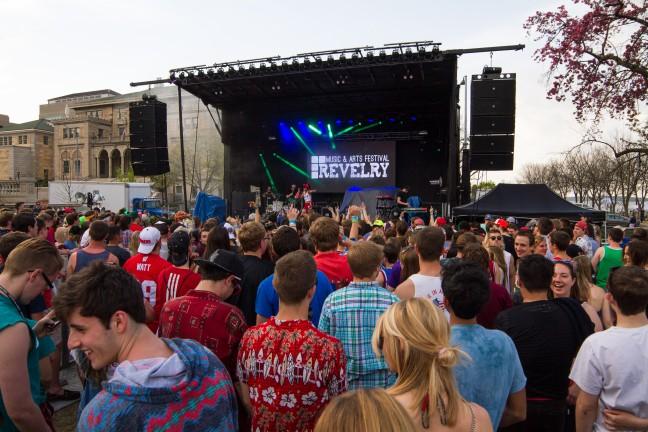If a woman doesn’t want to be sexually assaulted, don’t go to a party. Don’t walk home alone. And according to a recent national survey conducted at undergraduate campuses, don’t go to college, because at University of Wisconsin more than one in four women have been assaulted.
Apparently, attending concerts is now added to the laundry list of things girls shouldn’t do in fear of sexual assault. In a recent article from The Badger Herald, “EDM’s sobriety issue: Low on musicianship, high on drugs,” the reporter criticizes the genre’s lack of musicality and social movement. More specifically, he repeatedly highlights how its superficial culture — grounded in substance abuse — inhibits experiences at concerts.
“The intense amount of noise, bright lights and alcohol causes people to make rash decisions,” the article said. “It is the trend to dress in revealing clothes and that, in addition to the overwhelming sensations, is a recipe for unwanted sexual contact.”
This is an extremely troubling statement. While its implication of rampant sexual assault at concerts is accurate, the article’s overall assessment of the issue is disturbing and false.
The article accurately notes the “defined rape problem” at concerts. The linked Vice article illustrates several first-hand accounts of rape at music festivals and concerts in the UK, including one instance in which a woman was grabbed by three men and dragged to a toilet.
A year before Vice’s exposé, Fox News reported, “While there is no agency that collects data about sexual assaults at concert venues and festivals, industry experts and law enforcement officials we talked to say that sexual assaults at these events are on the rise.”
This assessment was also immersed within an inexhaustive string of recent offenses, including a man allegedly raping a 17-year-old girl on a lawn at a Keith Urban concert in broad daylight, while onlookers did nothing.
These statistics and individual horror stories are not merely shocking headlines or an intangible epidemic contained behind closed doors. They reflect the physical and psychological ramifications of blaming sexual assault on its victims, rather than its perpetrators and passive bystanders.
Rape culture describes a society in which women are blamed for their own assault, and by extension, their own apparent insubordination, such as wearing too little or drinking too much. For example, the Badger Herald article notes that a “trend to dress in revealing clothes” and “overwhelming sensations” are a “recipe for unwanted sexual contact.”
This attribution of rape to scanty dresses, drugs and music — rather than the perpetrator — is an indication of a culture that not only minimizes rape, but blames its victims.
While it cannot be denied that alcohol and drugs — mixed with the “escapist” atmosphere of concerts and music festivals — may very well grant individuals with a heightened sense of freedom and entitlement to blame sexual assault on these factors is to excuse the individual who committed the crime.
In turn, victims are told they are not only unwelcome in the environment where the assault took place, but they are endangered in it as well. In short, if a woman doesn’t want to be sexually assaulted, don’t go to a concert.
The price of sexual assault is therefore not only the psychological and physical suffering for the victim, but the destruction of equal opportunity. When women attend a concert, they are not “asking for it.” They are exercising their rights to equally partake in culture. By demanding that they refrain from this equal participation — whether in a turtle-neck or tube top — is to take away that right.
Unfortunately, this sentiment is not contained to the ambiguous, rolling crowds of rowdy concerts. Those on the other side — the musicians themselves — experience rape culture.
Most recently after Ke$ha charged her producer Dr. Luke with sexual assault, her label Sony refused to allow her to record an album without him.
“Ke$ha now faces an abysmal decision,” Mark Gerago, Ke$ha’s lawyer, said. “Work with her alleged abuser … or idly and passively wait as her career tick-tocks away.”
The disregard of Ke$ha’s perspective and alleged experience demonstrates explicitly how rape culture can bar a woman from equally engaging in society. If she continues the fight against her alleged attacker, Ke$ha’s career is jeopardized.
In regard to violence against women, including sexual violence, feminist and author Gloria Steinem said the following:
“We have to imagine change before we can begin to move toward it. Then we also need to not only stand at the side of the river bend and rescue the people who are drowning, which is crucial … But some of us also need to go to the head of the river and see why people are falling in.”
In light of rape culture at concerts and beyond, I hope society can learn to not only comfort and protect victims, but to properly attribute why they are attacked in the first place.


